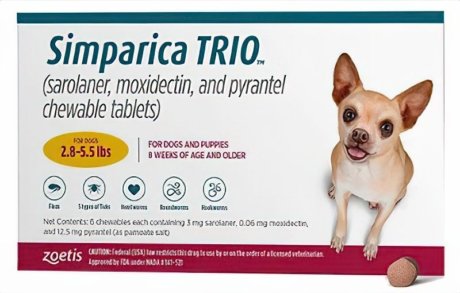Trazodone For Dogs : A Comprehensive Guide to Its Uses, Benefits, and Risks
Pet owners know that ensuring the happiness and well-being of their dogs is a top priority. Among the various concerns that can affect dogs, managing anxiety and behavioral issues is often a significant challenge. In recent years, Trazodone, a medication originally developed for humans, has emerged as a potential solution for these issues in dogs. In this extensive guide, we will delve deep into the world of Trazodone for dogs, exploring its various uses, benefits, potential risks, and much more.
Understanding Trazodone
What Is Trazodone?
Trazodone is a medication that belongs to the class of serotonin antagonist and reuptake inhibitors (SARIs). Originally designed to treat depression in humans, veterinarians have started considering its use for addressing behavioral problems in dogs.
Trazodone for dogs works by increasing the levels of serotonin in the brain. Serotonin is a neurotransmitter associated with feelings of well-being and happiness. In dogs, this increase in serotonin can help alleviate anxiety and stress-related behaviors.
How Does Trazodone Work?
To better understand the use of Trazodone in dogs, it’s crucial to grasp its mechanism of action. This medication primarily affects serotonin receptors in the brain. It works by blocking certain serotonin receptors, thereby increasing serotonin levels by preventing its reuptake. This ultimately leads to an enhanced sense of well-being in dogs.
In practical terms, this means that Trazodone can help calm your dog’s anxiety, reduce stress, and improve overall behavior. Importantly, it doesn’t merely mask the symptoms but addresses the underlying causes of their distress.
Is Trazodone For Dogs The Same As For Humans
Trazodone is a medication used in both dogs and humans, but there are differences in dosages and formulations. The active ingredient is the same, but the dosage and form may vary. Trazodone for dogs is typically prescribed in a veterinary-specific formulation, and the dosage is adjusted to suit a dog’s specific needs. Human Trazodone is not recommended for dogs due to the differences in dosages and formulations.
Trazodone For Dogs How Long Does It Last
The duration of Trazodone’s effects in dogs can vary depending on the individual dog and the specific condition being treated. Generally, Trazodone’s calming effects in dogs typically last around 4 to 6 hours. However, the duration can be influenced by factors such as the dog’s size, the dosage administered, and the dog’s metabolism. It’s essential to follow your veterinarian’s instructions for dosing and to monitor your dog’s response to determine the duration of effect in your specific case.

50 Mg Trazodone For Dogs Dosage Chart
Please find a general dosage chart for Trazodone in dogs based on weight:
| Dog Weight (lbs) | Trazodone Dosage (50 mg tablets) |
|---|---|
| 5 – 10 | 25 mg (half a tablet) |
| 11 – 20 | 50 mg (1 tablet) |
| 21 – 30 | 100 mg (2 tablets) |
| 31 – 40 | 150 mg (3 tablets) |
| 41 – 50 | 200 mg (4 tablets) |
| Over 50 | As directed by a vet |
This is a general guideline, and the actual dosage should be determined by your veterinarian based on your dog’s specific condition and needs.
100mg Trazodone For Dogs Dosage Chart
Here’s a general dosage chart for Trazodone in dogs with 100 mg tablets:
| Dog Weight (lbs) | Trazodone Dosage (100 mg tablets) |
|---|---|
| 11 – 20 | 50 mg (half a tablet) |
| 21 – 30 | 100 mg (1 tablet) |
| 31 – 40 | 150 mg (1.5 tablets) |
| 41 – 50 | 200 mg (2 tablets) |
| Over 50 | As directed by a vet |
As with any medication, the actual dosage should be determined by your veterinarian based on your dog’s specific condition and requirements.
150mg Trazodone For Dogs Dosage Chart
Here’s a general dosage chart for Trazodone in dogs with 150 mg tablets:
| Dog Weight (lbs) | Trazodone Dosage (150 mg tablets) |
|---|---|
| 21 – 30 | 100 mg (2/3 tablet) |
| 31 – 40 | 150 mg (1 tablet) |
| 41 – 50 | 200 mg (1.3 tablets) |
| Over 50 | As directed by a vet |
Always follow the dosage recommendations provided by your veterinarian, as they will consider your dog’s specific needs and condition when prescribing Trazodone.
Common Uses of Trazodone in Dogs
Anxiety Management
Anxiety is a prevalent issue among dogs, whether it’s triggered by separation, loud noises, or general unease. Trazodone has shown remarkable effectiveness in managing various types of anxiety in dogs. Whether it’s separation anxiety, noise phobias (such as fireworks or thunderstorms), or generalized anxiety, this medication can provide significant relief.
One of the most notable aspects of Trazodone is its ability to reduce anxiety without causing excessive sedation. This is a crucial advantage because it allows your dog to remain alert and active while experiencing a significant reduction in anxiety.
Aggression Control
For dogs exhibiting aggressive behavior, Trazodone can be a valuable tool. It helps by reducing the emotional reactivity that often leads to aggression. When used in conjunction with behavior training, Trazodone can make the training process more effective and less stressful for both the dog and the owner.
Fear of Thunderstorms and Fireworks
Many dogs experience severe anxiety during thunderstorms and fireworks displays. Trazodone can help calm them down during these stressful events, providing much-needed relief. The fast-acting nature of Trazodone means that it can be administered as soon as you anticipate a triggering event, giving your dog quick relief from anxiety.
Travel Anxiety
Traveling with a nervous or anxious dog can be challenging for both pet and owner. Trazodone can make these experiences more manageable. Whether it’s a short car ride to the vet or a longer journey, Trazodone can help ease travel-related anxiety, making the experience more enjoyable for your furry friend.
Administering Trazodone to Dogs

Trazodone Dosage For Dogs
Administering Trazodone to your dog requires careful consideration of dosage and guidelines. The appropriate dosage depends on factors such as your dog’s size, weight, and the specific condition being treated. It’s crucial to consult your veterinarian, who will determine the correct dosage for your dog’s unique needs.
Typically, Trazodone is administered orally and can be given with or without food, depending on your veterinarian’s recommendations. The dosage may vary, so it’s essential to follow your veterinarian’s instructions carefully to ensure your dog’s safety and the medication’s effectiveness.
Trazodone For Dogs Dosage Chart
Here’s a Trazodone dosage chart for dogs based on weight:
| Dog Weight (lbs) | Trazodone Dosage (mg) |
|---|---|
| 5 – 10 | 25 mg |
| 11 – 20 | 50 mg |
| 21 – 30 | 100 mg |
| 31 – 40 | 150 mg |
| 41 – 50 | 200 mg |
| Over 50 | 200 mg or as directed by a vet |
Safety Precautions
While Trazodone is generally safe for dogs, it’s important to be aware of potential side effects and interactions with other medications. Some dogs may experience mild side effects such as drowsiness, gastrointestinal upset (vomiting or diarrhea), or an increased heart rate. These side effects are usually temporary and can be managed with your veterinarian’s guidance.
One important consideration is the potential for serotonin syndrome, although it is rare. Serotonin syndrome is a serious condition characterized by symptoms such as agitation, rapid heart rate, high body temperature, and muscle tremors. If you notice these signs in your dog, seek immediate veterinary attention.
Benefits of Using Trazodone
Non-Sedative Properties
One of the primary advantages of Trazodone is its non-sedative nature. Unlike some other anxiety medications, Trazodone tends to have a minimal sedative effect. This means that your dog can remain alert and active while feeling less anxious. It’s an excellent option for situations where you want to reduce anxiety without causing drowsiness.
Fast-Acting Relief
Trazodone typically takes effect within 30 minutes to an hour after administration, making it a suitable choice for situations that require immediate relief. Whether it’s a sudden anxiety-inducing event or a scheduled car trip, Trazodone can help your dog feel calmer relatively quickly.
Non-Habit Forming
Trazodone is not known to be habit-forming in dogs. This means that you can use it as needed without concerns about long-term dependency. This flexibility is particularly valuable when managing situational anxiety or sporadic behavioral issues.
Trazodone For Dogs Side Effects
1. Drowsiness
While Trazodone is less sedative than some other options, it can still cause drowsiness in some dogs. This side effect can vary among individuals, so it’s essential to monitor your pet’s response to the medication. In most cases, the drowsiness is mild and doesn’t interfere with daily activities.
2. Gastrointestinal Upset
In some cases, dogs may experience gastrointestinal upset when taking Trazodone. This can manifest as vomiting or diarrhea. While these side effects are generally temporary, it’s crucial to report them to your veterinarian, who can offer guidance on managing them.
3. Serotonin Syndrome
Serotonin syndrome is a rare but serious side effect of Trazodone. Symptoms include agitation, rapid heart rate, high body temperature, muscle tremors, and dilated pupils. If you notice any of these signs in your dog, seek immediate veterinary attention. While the risk of serotonin syndrome is low, it’s vital to be aware of this potential complication.

Trazodone For Dogs Side Effects Urination
Trazodone is a medication commonly used in dogs to treat anxiety and behavioral issues. While it can be effective, it’s important to be aware of potential side effects. One side effect that some dog owners have reported is changes in urination patterns. Here’s some information about Trazodone and its potential effects on urination:
Trazodone and Urination:
- Increased Urination: Some dogs may experience an increase in urination frequency or urgency while taking Trazodone. This is not uncommon, as the medication can affect the dog’s serotonin levels, leading to changes in bodily functions, including urination.
- Incontinence: In some cases, Trazodone may lead to temporary incontinence in dogs, especially if the dosage is relatively high. This means the dog might have difficulty controlling their bladder and may urinate involuntarily.
- Individual Variability: It’s essential to note that not all dogs will experience these urination-related side effects. The response to Trazodone can vary from one dog to another.
- Dosage Adjustment: If your dog experiences problematic urination side effects while on Trazodone, it’s crucial to consult with your veterinarian. They may recommend adjusting the dosage or trying an alternative treatment to alleviate the side effects.
- Monitoring: While your dog is taking Trazodone, it’s important to monitor their urination patterns and report any unusual changes to your veterinarian. This will help ensure your dog’s well-being and the effectiveness of the treatment.
Alternative Therapies
Behavioral Training
Behavioral training techniques can complement the use of Trazodone in managing anxiety and behavioral issues. Positive reinforcement training, desensitization, and counterconditioning
can be effective strategies to address the root causes of your dog’s anxiety.
Natural Remedies
In addition to medication, natural remedies such as herbal supplements and pheromone therapies can be used alongside or as an alternative to Trazodone. Discuss these options with your veterinarian to determine what might be most suitable for your dog.
Consultation with a Veterinarian
The Importance of Professional Guidance
Before starting Trazodone or any other anxiety management plan for your dog, it’s crucial to consult with a veterinarian. They can provide personalized advice based on your dog’s specific needs and circumstances. Your veterinarian will assess your dog’s health, consider potential interactions with other medications, and determine the appropriate dosage.
Veterinary Prescription
Trazodone is a prescription medication, and it should only be administered under the guidance of a licensed veterinarian. Your veterinarian will evaluate your dog’s condition, provide a prescription if necessary, and monitor their progress while on the medication.
Real-Life Success Stories
Testimonials
Reading real-life testimonials from dog owners who have used Trazodone can offer valuable insights into its effectiveness. These stories can provide reassurance and encouragement to those considering Trazodone as part of their dog’s treatment plan.
Additional Considerations
Trazodone and Senior Dogs
Trazodone can benefit senior dogs who may experience age-related anxiety and behavior changes. Consult with your veterinarian to explore how Trazodone can improve your senior dog’s quality of life.
Trazodone as a Pre-Surgery Sedative
Trazodone is sometimes used as a pre-surgery sedative to reduce anxiety in dogs before medical procedures. Discuss this option with your veterinarian if your dog is facing surgery.
Trazodone and Puppy Training
Puppy Socialization
Trazodone can play a role in socializing puppies and helping them adjust to new environments and experiences. Consult your veterinarian and a professional dog trainer for guidance on incorporating Trazodone into your puppy’s training plan.
Crate Training
Crate training is an essential part of a puppy’s development, and Trazodone can aid in making it a positive experience. Consult with your veterinarian and a dog trainer for crate training tips and Trazodone use recommendations.
Trazodone vs. Other Medications
Comparing Trazodone to Benzodiazepines
Understanding the differences between Trazodone and benzodiazepines is crucial when considering options for managing canine anxiety. Your veterinarian can help you make informed decisions about the most suitable treatment.
Trazodone vs. SSRIs
Comparing Trazodone to selective serotonin reuptake inhibitors (SSRIs) can provide insights into the best approach for managing your dog’s anxiety and behavioral issues. Consult your veterinarian to explore these treatment options.
Managing Noise Phobias

Firework Anxiety
Managing firework anxiety in dogs requires a multifaceted approach. Learn about strategies that combine Trazodone with behavioral techniques to help your dog cope during fireworks displays.
Coping with Loud Events
Loud events such as construction noise and celebrations can trigger anxiety in dogs. Explore methods to help your dog cope with these situations, including the use of Trazodone when appropriate.
The Future of Trazodone Research
Ongoing Studies
Stay informed about ongoing research and studies related to Trazodone and its potential applications in veterinary medicine. The field of anxiety management for dogs is continuously evolving, and new insights may lead to improved treatment options.
Innovations in Anxiety Management
The use of Trazodone is part of the evolving landscape of anxiety management in dogs. As research continues, innovative approaches may emerge, offering even more effective solutions for our canine companions.
Trazodone For Dogs Without Vet Prescription
Trazodone is a prescription medication often used to treat anxiety and behavioral issues in dogs. It’s important to note that obtaining Trazodone for your dog without a veterinarian’s prescription is not recommended. Veterinarians prescribe medications based on a thorough evaluation of your dog’s specific needs, taking into consideration their health, size, and any potential interactions with other medications.
Self-medicating your dog can be risky and may not provide the desired results. It’s always best to consult a qualified veterinarian to discuss your dog’s behavior or anxiety problems. They can recommend the appropriate treatment and dosage, as well as monitor your dog’s progress to ensure their well-being and safety.
Trazodone For Dogs Reviews
Trazodone is a commonly prescribed medication for dogs dealing with anxiety, fear, or behavioral issues. Here are some reviews from pet owners who have used Trazodone for their dogs:
- Positive Experience: Many dog owners have reported positive results with Trazodone. They note that it helped their dogs relax during stressful situations such as thunderstorms, fireworks, or car rides. Some also mentioned improvements in overall behavior and reduced anxiety.
- Calming Effect: Trazodone is often praised for its calming effect on dogs. Some users have mentioned that it allowed their pets to be more at ease, which was especially beneficial in situations like vet visits or grooming.
- Reduced Aggression: In cases where aggression was a concern, Trazodone was found to be helpful in reducing aggressive behavior, making interactions with other dogs and people safer.
- Minimal Side Effects: Many users reported minimal side effects, and most dogs tolerated the medication well. However, it’s essential to follow the veterinarian’s prescribed dosage and guidelines to minimize the risk of side effects.
- Individual Variability: Keep in mind that not all dogs respond the same way to Trazodone. The effectiveness can vary based on the dog’s specific condition and needs, so it’s important to work closely with a veterinarian to determine the right treatment plan.
Conclusion:
In conclusion, Trazodone can be an invaluable tool in managing anxiety and behavioral issues in dogs, provided it is used responsibly and under the guidance of a licensed veterinarian. Its non-sedative, fast-acting, and non-habit-forming properties make it a popular choice among pet owners. However, it’s crucial to be aware of potential side effects and administer the medication with care.
Frequently Asked Questions (FAQs):
-
Is Trazodone safe for all dog breeds?
Trazodone can be used for various dog breeds, but its suitability depends on individual factors. Consulting with your veterinarian is essential to determine if it’s the right choice for your dog.
-
Can I give my dog Trazodone without a prescription?
No, Trazodone is a prescription medication, and it should only be administered under the guidance of a licensed veterinarian. Self-administration can lead to incorrect dosing and potential risks.
-
How long does Trazodone’s effect last in dogs?
The duration of Trazodone’s effect can vary among dogs but generally lasts between 4 to 8 hours. Follow your veterinarian’s instructions for proper timing, especially in situations requiring extended relief.
-
Are there any interactions between Trazodone and other medications?
Trazodone can interact with certain medications, so it’s crucial to inform your veterinarian of any other drugs your dog may be taking. This ensures safe and effective treatment.
-
Can I use Trazodone for long-term anxiety management in my dog?
Trazodone is generally considered safe for short-term use. If long-term use is required, it should be discussed with your veterinarian to assess the benefits and potential risks.
-
Can I split Trazodone tablets for smaller dogs?
For smaller dog breeds, splitting Trazodone tablets to achieve the correct dosage can be challenging. It’s essential to consult with your veterinarian to determine if this is a safe and effective option for your specific dog.
-
Are there any age restrictions for using Trazodone in dogs?
Trazodone is generally safe for dogs of various ages, including puppies and senior dogs. However, the dosage and duration of use may vary based on age and individual health considerations. Always consult with your veterinarian for guidance.
-
Can Trazodone be used in combination with other anxiety medications?
Combining Trazodone with other anxiety medications is possible but should only be done under the supervision and guidance of a veterinarian. This approach is typically reserved for severe cases of anxiety that do not respond to Trazodone alone.
-
Is Trazodone effective for long-term use in dogs with chronic anxiety?
While Trazodone is generally considered safe for short-term or situational use, its long-term effectiveness and safety for chronic anxiety require careful consideration and monitoring by a veterinarian. Discuss long-term treatment options with your veterinarian to make informed decisions about your dog’s care.
-
Can Trazodone be used to manage anxiety during veterinary visits?
Yes, Trazodone can be administered before veterinary visits to help reduce anxiety and stress. Inform your veterinarian in advance, and they can advise you on the appropriate dosage and timing to ensure a smoother and less stressful visit for your dog.
Recommended:
Metronidazole For Dogs | 4 Common Uses, Dosage, Side Effects, Care Tips
Giardia in Dogs | Symptoms, Treatment, Natural Remedies and More





























